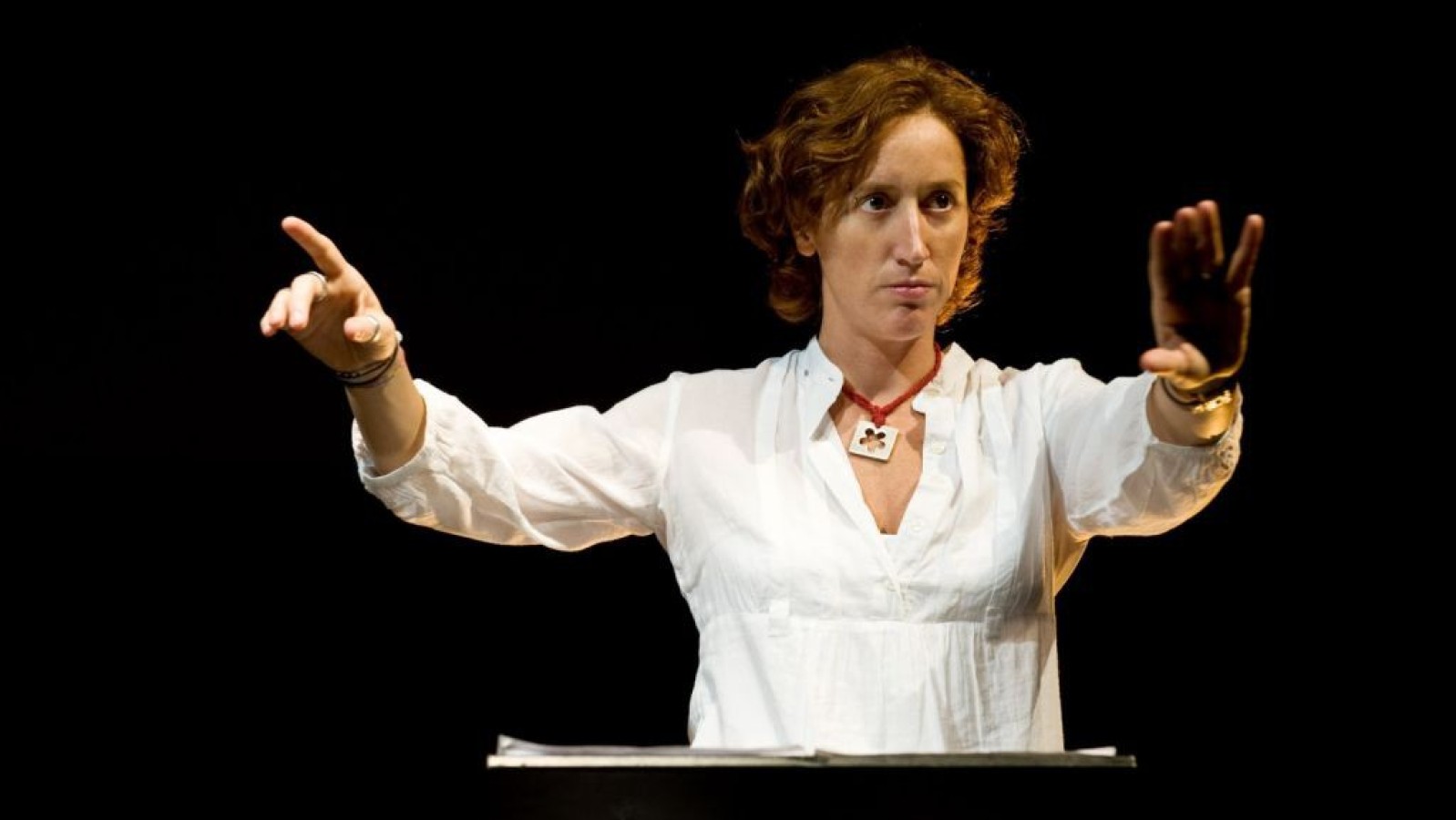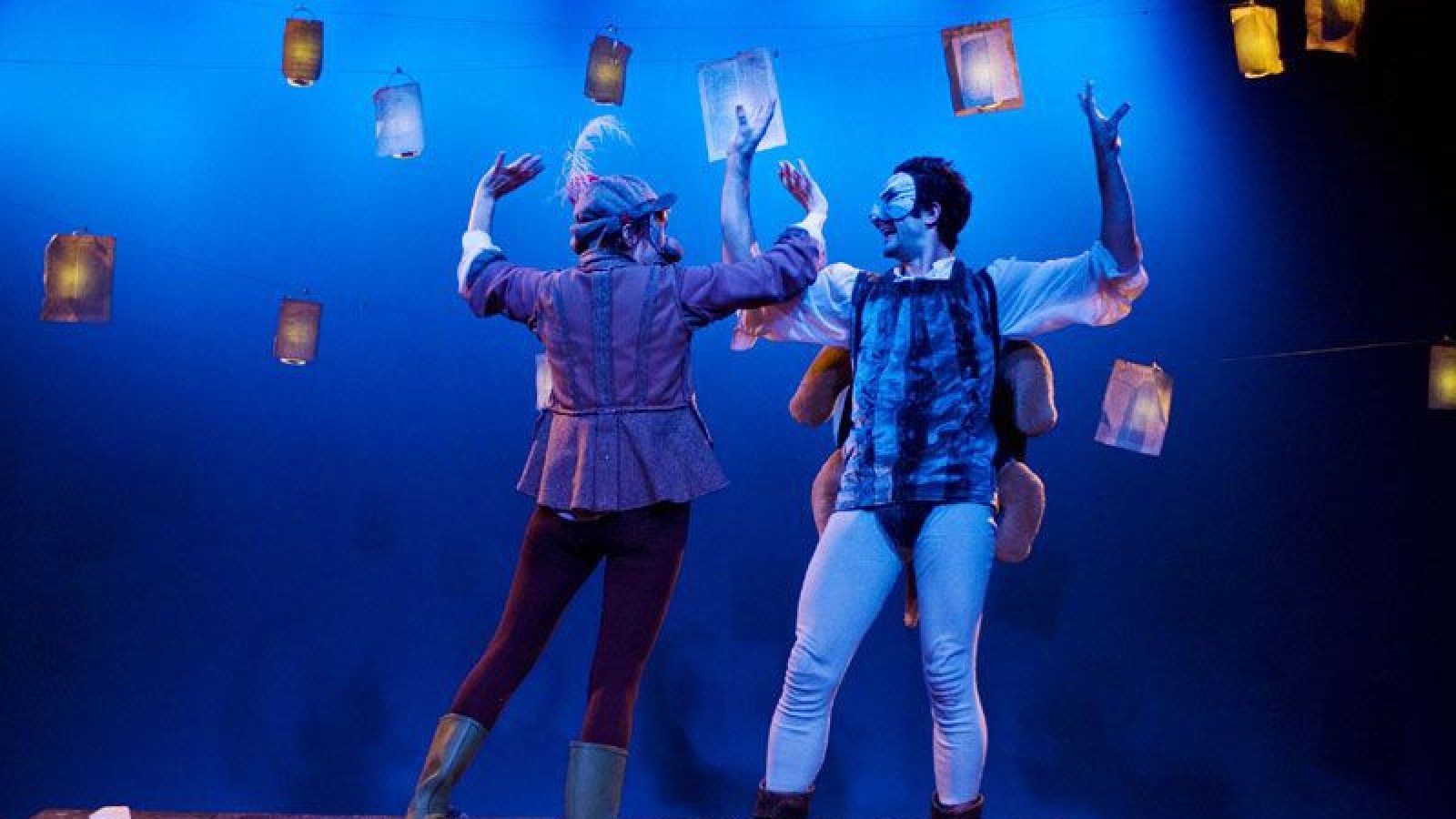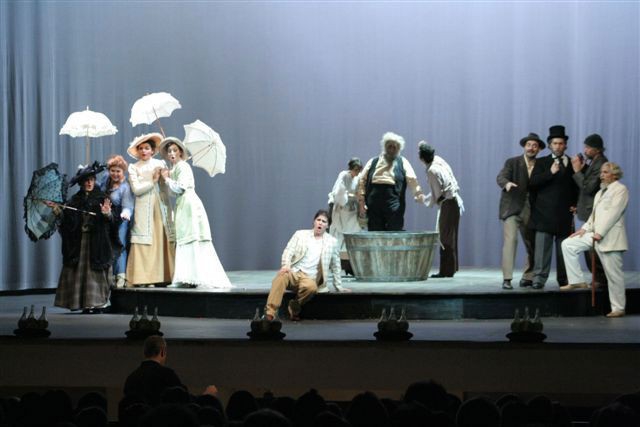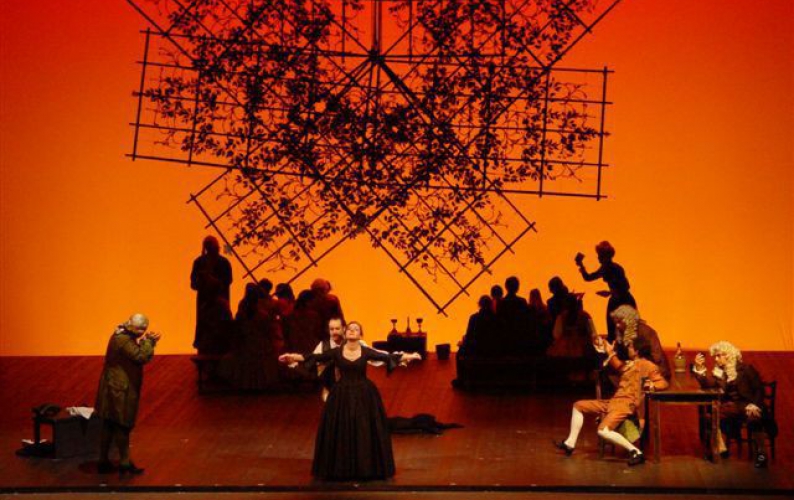Serena SINIGAGLIA
Director
Born in Milan, she graduated in directing at the Civica Scuola di Arte Drammatica Paolo Grassi in Milan. Founder, president and artistic director of the theatre company A.T.I.R. based in Milan, artistic director, together with Lella Costa, of the Teatro Carcano in Milan and teacher of direction at NABA school in Milan.
Awarded by several theater prizes including Best Staging of the Year 2022 awarded by the Italian Association of Theatre Crtics, Donnediscena as best director of the year, the Hystrio prize, the Milanodonna prize for women who have contributed to the cultural and social growth of the City of Milan, the Regium Giulii prize for best world premiere of the novel E tutto fu diverso written by Serena Sinigaglia and many others.
Among her opera productions are L'Incoronazione di Poppea at the Theater Kiel, Pagliacci at the Teatro Comunale of Bologna, Teatro Valli in Reggio Emilia and at the Grand Théâtre de Genève, Il Giasone at the Grand Théâtre de Genève and at the Opéra Royal du Château de Versailles, Tosca at the Teatro La Fenice in Venice, Cavalleria Rusticana at the Teatro Sociale of Como, Carmen at the Macerata Festival, Adelina at the Rossini Opera Festival in Pesaro, Don Pasquale at the Landestheater of Salzburg, Werther, William Tell, Falstaff, Le Nozze di Figaro, Orfeo ed Euridice and Don Giovanni for the Lombard opera houses of Cremona, Pavia, Como, Brescia and Bergamo.
Staged plays, classic and modern, include: Macbeth, The Merry Wives of Windsor and Romeo and Juliet by Shakespeare, Isabel Green by E. Aldrovandi, Fame mia, quasi una biografia by A. Marchioro and G. Scotti, Rosalyn by E. Erba, Ivan from The Brothers Karamazov, The Bacchae by Euripides, Lear, ovvero tutto su mio padre from King Lear by Shakespeare, The love story of Eloisa and Abelardo freely taken from the epistolary between Eloisa and Abelardo and Storia delle mie disgrazie by P. Abelardo, Semplicemente no freely taken from Letters of death sentenced of the European resistance, Where is the wonderful life? by R. Ciaravino, The open door or a meeting on theatre, Natura morta in un fosso by F. Paravidino (Ubu Award best young actor), El Che: life and death of Ernesto Guevara by M. Marelli, The Golden Age by L. Curino, Rosa la rossa by S. Antinori, Il Grigio, a production of the Piccolo Teatro in Milan and Il 68 by Serena Sinigaglia and Paola Ponti.
She signs the direction of Euripides' The Trojan Women with insertions of other texts from Homer's Iliad; Dinner with Claude by F. Doboìs a radio drama for the Italian public radio Rai Radio 3; The Hook based on a novel by N. Goldimer, adapted by S. Sinigaglia; The bug by V. Majakovskij, The Beauty and the hell by Roberto Saviano, Napoli non si misura con la mente staged at the Naples Theater Festival and broadcast by Italian public TV RAI.
Photos by Serena Serrani
RELATED NEWS

«Pagliacci» Teatro Comunale Bologna 2019
Nuovo è, invece il lavoro di Serena Sinigaglia per l'opera di Leoncavallo, nuovo e molto efficace per la cura del dettaglio e la sobrietà di un disegno chiaro, lucido, personale.
Roberta Pedrotti, L'Ape Musicale
«Pagliacci» Grand Théâtre de Genève 2018
Cav & Pag In The Age Of #MeToo
In this time of female empowerment, Geneva’s Grand Théâtre had the innovative idea to ask two female directors to stage the beloved Mascagni – Leoncavallo Italian double bill.
Each of them had different styles and ideas. Emma Dante focused on symbols. Her sets and costumes were simple and spartan. Nearly everybody wore black except for a few characters and in particular the Virgin Mary following a cross-carrying Christ. At the end, she returns and gives Mamma Lucia the same blue shawl she is carrying, this establishing a parallel between both losing their child. Serena Sinigaglia’s strengths were in psychology and character development. The scene opened with the stage unprepared and Tonio sang the Prologue while the sets went up. This is a lively ‘Brechtian’ moment that worked well with the words. The duo between Nedda and Silvio had genuine fire and the comedia dell’arte performance was dramatically chilling. In each work, women are dramatic figures: Santuzza, Mamma Lucia and Nedda are sacrificed in the name of honour and jealousy in male-dominated world.
Antoine Lévy-Leboyer, Seen and Heard International
«Il Giasone» Grand Théâtre de Genève 2017
La mise en scène de Serena Sinigaglia offre un délicat équilibre entre les moyens minimalistes des représentations vénitiennes de l'époque, dans des théâtres aux proportions réduites, et la part de merveilleux et d'imaginaire indispensable pour attirer le public à ces représentations. Côté minimaliste, le décor est réduit à quelques rochers au centre de la scène et aux nuages qui l'encadrent ; une toile de fond évoque le ciel de l'Olympe (et rappelle que les dieux sont « aux manettes » de cette intrigue). Elle a été conçue par Ezio Toffolutti à partir d'une esquisse de décor de Torelli qui nous est parvenue. Y répondent les costumes simples des principaux personnages, comme l'habit de marin de Jason. Le merveilleux renvoie à l'opéra de cour, moqué dans le prologue de la partition où Soleil et Amour se disputent comme de vulgaires humains. Il se manifeste dans les flamboyants costumes de cuir coloré du Soleil, de Jupiter et d'Eole, ou le vol des deux colombes, maniées depuis des bâtons, autour de Médée et Jason, dans la pénombre du début du troisième acte. Entre ces deux pôles des allusions satiriques omniprésentes soulignent le caractère résolument comique de ce dramma per musica : un Amour empâté dans une combinaison boudinante, qui exhibe un sexe ridicule, un Hercule tatoué jusqu'aux yeux, le ballet incessant des deux berceaux doubles au troisième acte... Cet humour empreinte parfois des voies plus raffinées, comme le caractère suranné des vêtements de style colonial années 1920 d'Hypsipyle et de ses suivantes quand elles débarquent à la recherche de Jason. On retiendra aussi l'intéressante contribution de la troupe de figurants (masculins et féminins), qui appuie à propos la progression de l'intrigue par des pantomines et des déplacements, et anime de courts ballets à la fin de chaque acte ou d'autres moments spectaculaires (comme le déclenchement des vents d'Eole). Ce mélange habile et singulier donne vitalité à l’œuvre scénique de Cavalli, tout en la resituant précisément dans le registre historique et lyrique de son époque.
Bruno Maury, Baroquiades
De cet ouvrage à visée satyrique, la metteur en scène Serena Sinigaglia parvient à tirer l’essence en mélangeant allègrement baroque et moderne, humour et pathétique, rythme et langueur, Olympe et Eden. La scénographie (imaginée par Ezio Toffolutti) présente des blocs de pierre disposés, selon les scènes, en arc de cercle ou en quinconce, révélant l’aspect primitif du mythe de la Toison d’or sur laquelle repose le livret. Des nuages ou des arbres peints ont pour mission de caractériser les espaces, rappelant en cela les scénographies baroques. Les accessoires et les costumes, tantôt Renaissance (pour les dieux), tantôt modernes, parcourent les époques, des malles du XIXème siècle, au casque d’explorateur des années 30, en passant par le costume des années 70 du personnage d’Egée jusqu’au smartphone avec lequel le Cupidon boursouflé et maladroit se prend en selfie devant un nuage. Le message, délivré dans le programme de salle, est clair : il s’agit avant tout de ne pas se prendre au sérieux. Cela n’empêche pas le souci du détail ni l’attention apportée au jeu de scène et à la direction d’acteurs, qui dynamise considérablement les trois heures de spectacle.
Damien Dutilleul, Olyrix
«Tosca» Teatro La Fenice Venezia 2015
Tosca triunfò de nuevo en La Fenice con la regia que Serena sinigaglia presentò en la anteriora temporada. Su lectura, de claro mensaje politico ecologista, propone una reflexion sobre la ruina y decadencia moral a la que lleva el consumismo compulsivo - personificado en el malvado Scarpia - en confrontacion con la belleza creada por el arte, la libertad y el amor, presentes en Tosca y Cavaradossi.
Opera Actual
Una regia ben collaudata quella di Serena Sinigaglia, ottimo lavoro, [...] un'ottima Tosca quella vista alla Fenice, una Tosca che non arriva mai al patetismo e che tramite la metafora di un mondo in fase di distruzione, sa raccontare la storia di un amore spezzato.
Stefano Duranti Poccetti, Corriere dell Spettacolo
La regista Serena Sinigaglia, applaudita più volte anche a Brescia, firma invece una Tosca dove quella romana evocata da libretto e musica viene completamente annullata da una scena decadente e buia, il cui progressivo disfacimento investe i protagonisti.
Fabio Larovere, Il Corriere della Sera
«Tosca» Teatro La Fenice Venezia 2014
La vità è un ring dove non si vince
[…] Attrezzi e costumi di scena sottolineano le date (Roma 1800), ma l’assito spoglio inclinato e sbrecciato
che, atto dopo atto, si squarcia dischiudendo il terreno roccioso e lunare del finale, ricorda che la vita è un
ring-palcoscenico astratto e spietato: dove non si vince. Disciplina e intensità dei gesti, bonifica negli effetti
ma rabbiosa varietà espressiva marcano la regia. […]
Angelo Foletto, La Repubblica, 18.05.14
Tosca minimalista tra tensione e realismo
Alla Fenice la regia di Serena Sinigaglia interpreta un Puccini moderno, senza i ricorrenti sentimentalismi,
ma da cantanti e orchestra letture più tradizionali […] Alla regia di Serena Sinigaglia, una delle figure più colte del nostro teatro di ricerca, non interessano le risonanze liberty, ma approfondisce un asciutto realismo, senza cedere al ricatto dei nuovi sentimenti, di cui si è troppo abusato in Puccini. Per questo il centro focale della sua forte interpretazione è il dialogo tra
Scarpia e Tosca nel secondo atto, di una sadica crudezza. La tensione della recitazione è l’aspetto più affascinante di questo spettacolo minimalista con costumi d’epoca primo Ottocento; non ci sono i soliti luoghi […] e il palcoscenico è ridotto a un pavimento con un cumulo di “macerie” (la parola è della Sinigaglia), che progressivamente si sgretola. Così la regista allude,
attraverso una metafora visiva, alla disgregazione del melodramma, che è al centro della modernità di Puccini e delle più aggiornate esegesi critiche. I colori terrei delle proiezioni potenziano la concezione tragica della regista.
Mario Messinis, Il Gazzettino, 18.05.14
La quarantunenne regista milanese ha esplicitato in una conferenza e in un’intervista le sue intenzioni. Ha letto nella frase di Scarpia “la cosa bramata perseguo, me ne servo e via la getto” una premonizione del consumismo compulsivo di oggi che deteriora e inquina l’ecosistema. Questa “catena perversa di desideri” fa dimenticare il bello e fa vincere l’incuria e l’abbandono, come accade per Paestum ed Ercolano.
Massimo Contiero, La Nuova Venezia, 18.05.14
Protagonista del teatro d’innovazione, Serena Sinigaglia firma con questa Tosca un allestimento di astratto vigore, molto tradizionalmente capace di mettere a fuoco il formidabile scontro di passioni che è il cuore del capolavoro di Puccini. […] Nella Sua essenzialità lo spettacolo raggiunge una concentrazione febbrile e nitidissima, che esalta il testo di Illica e Giacosa illuminando di luce radente il fiorito poetare del secondo e schiude la porta a un mondo di sfumature rivelatrici.
Cesare Galla, Il Giornale di Vicenza, 24.05.14
La netta contrapposizione fra l’orribile realtà al cui centro domina il capo della polizia romana e la dimensione fatta di arte e di amore in cui si muove Floria, è l’assunto che sta alla base della regia di Serena Sinigaglia per Tosca, in scena alla Fenice. E’ uno spettacolo forte, esplicito, di potente impatto teatrale, che affronta a petto in fuori il rischio dell’enfasi e ne esce nel complesso vincitore….
Adolfo Andrighetti, asterisco net.it
«Falstaff» Teatro Fraschini Pavia 2008
lo spettacolo di Serena Sinigaglia è stato molto applaudito dal pubblico pavese e non si può non sottolineare come questa giovane regista abbia saputo fornire una lettura dal ritmo narrativo trascinante, ricco di trovate originali e tutta giocata sul movimento frenetico ma sincronizzato dei personaggi in scena. La Sinigaglia ha saputo veramente costruire uno spettacolo basato soprattutto su di un attento ed approfondito lavoro di regia compiuto insieme ai cantanti. L'impianto scenico sostanzialmente fisso e delimitato in fondo da un ampio panneggio bianco (scene di Maria Spazzisi illuminate dalle luci di Nicholas Bovey) si caratterizza per l'economia dei mezzi utilizzati (botti per il vino, cespugli, fili per stendere i panni, ecc.), i quali vengono tuttavia impiegati in modo molto razionale ed estremamente intelligente, fornendo lo spunto per soluzioni efficaci, fantasiose e di grande presa sul pubblico...La Sinigaglia ha anche adottato ed ampiamente applicato un procedimento tipico di un altro grande regista di teatro musicale: Jean Pierre Ponnelle il quale movimentava il ritmo narrativo inserendo sulla scena anche personaggi non previsti dalle didascalie del libretto ma comunque indirettamente presenti in quanto chiamati in causa dalle parole di un altro personaggio
Fulvio Zannella, www.operaclick.com, novembre 2008
«Le Nozze di Figaro» Brescia, Pavia, Cremona, Como 2005
Serena Sinigaglia, giovane ed interessante regista milanese, capisce al volo un paio di cose fondamentali: la prima è che il plot delle Nozze, ovviamente per chi non conoscesse l'opera, è anche troppo ridondante; lei stessa definisce la trama, nelle note di regia, «fin troppo arzigogolata» e sceglie di rispondere non solo con la imposta semplicitá di mezzi ma con una essenzialità che fa leva sulla recitazione e sui movimenti....
L'Opera, decembre 2005
«Falstaff» Landestheater Salzburg 2005
Mit der zweiten Opernproduktion des Salzburger Landestheaters unter dem neuen Intendanten Peter Dolder weht eine frische Prise durchs Haus: Die 31-jährige italienische Regisseurin Serena Sinigaglia inszeniert Verdis Oper "Falstaff" mit neuen Ideen und Sinn fürs Komische. ORF-TV
Die Opernpremiere am Samstag hatte Charme. Man verdankt ihn der italienischen Regisseurin Serena Sinigaglia. Sie versetzt das geniale Alterswerk des 80-jährigen Giuseppe Verdi in einen hellen, offenen Raum, auf eine Pawlatschenbühne (Bühnenbild: Maria Spazzi). ....Verstecken gilt hier nicht. Das böse Spiel, das die Frauen von Windsor mit dem liebestollen alten Gecken Falstaff treiben, ist somit immer für alle einsichtig. Es wird komödiantisch am Laufen gehalten. Immerzu geht es quirlig zur Sache, und es genügen nicht nur die zehn Vokalsolisten, sondern man braucht noch zwei stumme Diener, die in allem Wirbel für zusätzliche pantomimische Bewegung sorgen.
Salzburger Nachrichten, 31 gennaio 2005
«Werther» As.Li.Co. Milano 2004
Ha trent'anni e un curriculum, tra lirica e prosa, che la sta proiettando verso la fulminea consacrazione. [...] E' la regista Serena Sinigaglia [...] ed effettivamente rappresenta una lieta sorpresa, che giunge ad hoc nel mondo del teatro d'opera italiano attuale, che sta producendo liete nuove sul fronte musicale ma assai meno sul quello della regia. Uno sfondo di sole luci e una teoria di siparietti mobili è tutto quanto basta alla Sinigaglia per raccontare una storia difficile come quella di "Werther" [...].Ecco allora che la narrazione scorre su un piano di delicatezza color pastello, su un minialismo buonista e new age, molto femminile invero, che ha tutti gli ingredienti per avvincere la platea, configurandosi al contempo come marchio registico inedito, almeno in Italia. [...] La realizzazione è ottima, poichè tutto scorre con la naturalezza che è propria soltanto dei registi dalla mano facile.
Enrico Girardi, Corriere della Sera, 23 novembre 2004
«Adelina» Rossini Opera Festival Pesaro 2003
Ottimo soprattutto il lavoro di Serena Sinigaglia (regia), Maria Spazzi (scene) e Alessandro Verazzi (progetto luci). Uno spettacolo che al brio e alla leggerezza della parte musicale sposa felicemente, facendo un po' il verso alla commedia dell'arte, un'altrettanto vivace e originale drammaturgia: vuoi con un indiavolato gioco di elementi scenici, semplici ma evocativi, che volano continuamente da un lato all'altro del palcoscenico suggerendo luoghi, atmosfere, e piu ancora stati d'animo; vuoi "imbrigliando" il canto e trasformandolo, esso stesso, in elemento scenico e "scatola magica" di situazioni.
Il messaggero, 28 agosto 2003
Avec des moyens limités, Serena Sinigaglia signe un modèle de mise en scéne inventive qui combine la simplicité du théâtre de tréteaux, la fraîcheur de la commedia dell'arte et une direction d'acteurs rigoureus.
LA LIBRE BELGIQUE, 13 agosto 2003
Di questo testo, assai meno fragile di quanto non suggerisca l'etichetta farsa, la giovane regista Serena Sinigaglia ha dato una lettura spigliata e leggera, sfruttando con fantasia e intelligenza i limitatissimi mezzi teatrali a disposizione. Con l'aiuto di un paio di mimi come servi di scena, impegnati in un incessante lavoro per montare e smontare le scene di Maria Spazzi, formidabile nel riciclare cassette da frutta, la Sinigalia ha costruito un doppio fondo ironico della vicenda, che racconta in primo piano come l'ingenua ragazza-madre del titolo ottenga alla fine, grazie ai buoni uffici del dotto locale, il perdono dello svizzerissimo padre e convoli a nozze con il giovane e ricco seduttore.
Il manifesto, 14 agosto 2003
«Orfeo ed Euridice» As.Li.Co. Milano 2003
E' prima di tutto un estroso spettacolo fatto (apparentemente) di nulla ma che dà molti punti a più blasonate e pretenziose produzioni [...] A fine stagione, il lavoro unico di "Opera Domani" e la sfavillante brillantezza teatrale dello spettacolo di Serena Sinigaglia può essere apprezzato anche dal pubblico adulto.
La repubblica, 13 maggio 2003
«Troiane» Venezia e Bassano del Grappa 2004
In the end we all find ourselves standing, as dragged by the force of narration, by its staging. Actors, lights, music, costumes. Everything apparently simple, sober, linear. Standing, everybody applauding the study preview of Troiane, directed by Serena Sinigaglia, from Euripides with some insertions from other texts, in particular Homer's Iliad. The starting idea of the young director is a double challenge: on one side the confrontation with classics, on the other side the confrontation with war, told through this classic that, reread today, look terribly up-to-date. A topicality that on stage has just little references in some costumes and above all in the chorus and in music: Ecuba, Queen of Troy, who sings Strange Fruit by Jimi Hendrix, Love is Blindness by U2 which accompanies the seductive and seduced Helen's dressed in white except Andromache who is dressed in black (a beautiful Maria Pilar Perez Aspa) and the perturbing Ecuba in grey lamé. But the real protagonist is light: simple lights but capable of keeping you still in front of a moving painting with actors acting on a black background. You can rediscover classics in this way as well, on an August night, in a small Venetian campo, thank to a young director and her young actors.
La nuova Venezia, 8 agosto 2004
Atir, maybe the most interesting company of the Italian experimental theatre, presented on preview in Bassano for OperaEstate Festival its Troiane, born from a master on the homonymous tragedy by Euripides and on the Iliad. Ezzelino's castle's walls have been the natural backdrop for the more than two hours performance of the sixteen actors always on stage, to whom the skilful direction of the young but already great Serena Sinigaglia imposed to use any expressive way (acting, singing, dancing) to fill just with stories a stage where the only elements are the suitcases of the women of Troy leaving for their slaves' future and the ashes of the city at the end of its bloody siege. Fire and ashes on stage and "grief over grief" as often said by Ecuba, symbol of the decline and destruction of the city of which she once was the queen - interpreted with disenchantment by Arianna Scommegna and reference point in the script together with the intense Andromache (Maria Pilar Perez Aspa). The dramatic ending of the war in the name of Helen (acted and narrated by the women) is interwoven with explanation of the antecedent facts narrated in the Iliad and assigned to men, in order to involve the audience in the precipitating sequence of events, memories and tears. This performance is really a long cry against war, wisely lightened by some veils of not banal hilarity, which helps the audience in keeping the required concentration. But it's also and overall theatre, authentic one. Lacking in rhetoric even if confronting with classics of mythology. Rich in fantasy, though strictly respecting the texts, in short pure, energy giving, directed theatre. Warmly applauded by the audience.
Il mattino di Padova, 29 luglio 2004
In the almost boring and surely annoying litanies about the situation of ideas in Italian theatre, we could, just to change register, look also to the positive signals that now and then feed hope. It surely is the case of the young Serena Sinigaglia who, with the complicity of the lively group A.T.I.R. she belongs to, seems not to miss a target. The staging of the not simple Euripides's text Troiane (Women of Troy) confirms it once more. It's a perfectly philological and well distilled actualization of the intense Euripidean text, with the support of some a parte from Iliad...
Instinct and a strong carnal component prevail on imagination distinguishing the two hours performance with an intense rhythm, dense with undertexts that enter one on the other creating tormenting combustion between the desperation of those who stay and little ironical gestures that strangle the ropes even more. A great collective performance, born from a long and settled confidence with the text
Hystrio, novembre 2004
(...) For the denunciation in dramatic form of the madness of war, the director Serena Sinigaglia invented strictly choreographed scenes of a machinery that produces victims in assembly line. The sixteen performers follow them with penetrating expressiveness. The Greek aggressors in black and dirty suits and the defeated Trojan women in a timeless white are always facing each other in new factions of hostility. Or they melt in sculptures of collective warlike destruction. The actors need just a few props to present the cruelty of bellicose contrasts: mud encrusted suitcases as exile's symbols pile up to form trenches or dead end streets. Male jackets pile up in heaps of corpses, to be then responsible for everybody, beside the tears and laments of the old woman for the loss of her entire family.
Kulturmagazin, 17 novembre 2004
The singing of the defeated rise from the destroyed city. Everyone has lost someone in that terrible war and the singing rising from the ruins of Troy is the tormented cry of women who saw horror and are setting off toward a new horror, that of slavery. Troiane is a long mourning that freezes the heart ... The tragedy of Troiane seems to start from the wish of changing the world; on one side there's the need of giving new voice to the opposition against war, on the other, the need of confronting with the universality and thoroughness of the classics here dressed in modern words.
Il gazzettino di Venezia, 5 agosto 2004
Young director on the crest of the wave, representative of a new kind of "narrative theatre" that makes use of different "techniques": traditional and non-traditional narration, choral singing and acting, Serena Sinigaglia with her Company A.T.I.R. tells us the atrocities of the war by crossing Euripides "Women of Troy" with extracts from Iliad: on one side the distress of the women getting ready to leave their houses and reduced to slavery, on the other hand the valour and virtue of the Homeric warriors. On one hand the anguish of the victims, on the other hand the pompous arrogance of the winners. At this level it becomes superfluous the famous sentence "anyone mentally sane must repudiate war" which, being so obvious, Sartre did cut out from the text; it is much more important Cassandra's sentence "with this wedding (with Agamemnon) I will destroy the Greek". Winners and losers, all have fallen into the same melting pot where the novel becomes a satire with comical peaks in Achilles' rage or in the gods intermezzo (between Poseidon and Athena).
The fate is doomed but its interpreters, the actors, can support it by contrasting it or mark it with their individual energy. In particular I am thinking about the impressive Maria Pilar Perez Aspa (Andromache), to her tears, her mourning, her pain for her fate that were moving, as were the bonfires waving good-bye during the women of Troy's leaving toward distance and unknown shores.
Il corriere della sera, 12 giugno 2005




